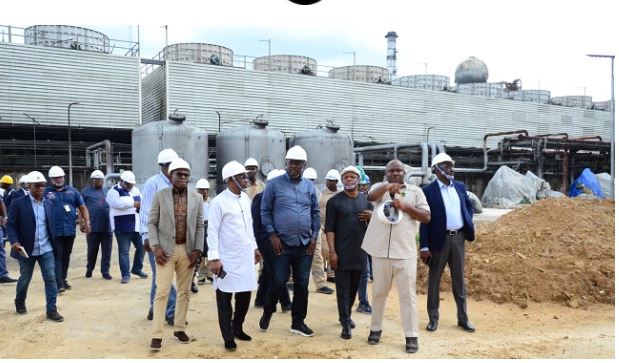Nigeria’s newly appointed Minister of State for Petroleum, Heineken Lokpobiri, announced on Friday the country’s optimistic outlook for its oil industry. The nation expects to see all four of its oil refineries fully operational by the close of this year, with the southern Port Harcourt facility potentially commencing operations as early as December.
The Port Harcourt refinery will begin processing oil by the end of 2022, the government announced last year. However, NNPC Ltd executives and succeeding oil ministers have launched a number of fruitless plans to restart, remodel, or enlarge the refineries. Despite past challenges and unsuccessful attempts by NNPC Ltd the government remains confident in the current initiatives.
Lokpobiri, who recently resumed his role, personally inspected the ongoing renovations at the two-unit Port Harcourt refinery. He expressed optimism, stating that the Port Harcourt facility is set to become operational by the year’s end.
“Our objective,” he emphasized, “is to make sure that Nigeria stops importing fuel in the next few years.”
As Africa’s leading oil producer, Nigeria has historically grappled with limited refining capacity and inadequate maintenance, leading to heavy reliance on fuel imports. The nation aims to reverse this trend and become self-sufficient in fuel production.
Two additional facilities, located in Warri and Kaduna, are projected to begin crude processing between the first quarter and the conclusion of 2024. The Minister indicated that the government is committed to revitalizing the oil industry and boosting domestic fuel production.
Previously deteriorating state-owned refineries, including the 110,000-barrel Kaduna facility in the north and three other facilities in the oil-rich Niger Delta, are part of the rejuvenation effort. These facilities, which collectively produced 450,000 barrels per day in their prime, are undergoing comprehensive renovation to restore their productivity.
The Port Harcourt refinery is currently undergoing a $1.5 billion overhaul, following a contract awarded to Italy’s Tecnimont. The project, slated for completion in 2021, faced delays but is now nearing finalization. Last April, the oil ministry projected that the renovation would span 44 months.
In addition to the refinery projects, Nigeria’s aspirations rest on the construction of a new 650,000-barrel-per-day refinery by Aliko Dangote, the continent’s wealthiest individual. This ambitious endeavor aims to significantly reduce or eliminate gasoline imports, potentially making Nigeria a fuel exporter.
The country’s renewed focus on refining capacity and reduced dependence on imports reflects a strategic move to enhance energy security and strengthen its position in the global oil market.















